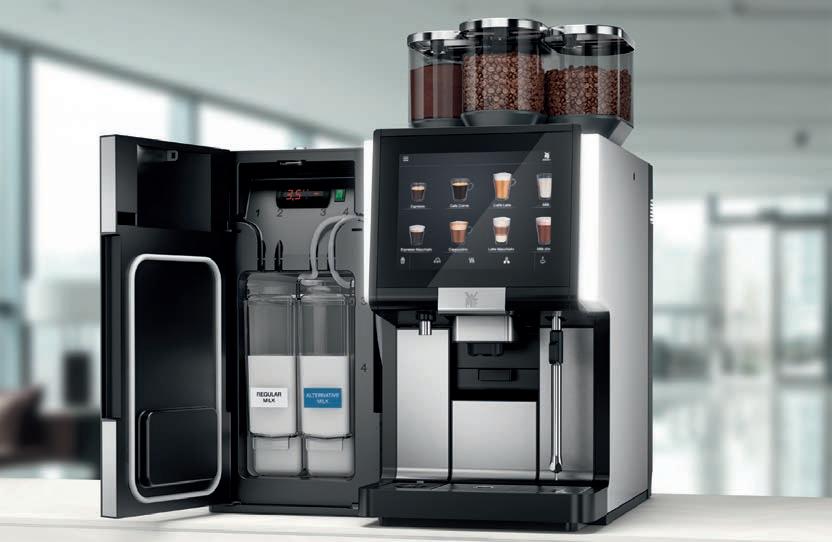
7 minute read
MORE THAN A SUBSTITUTE
WMF PROFESSIONAL COFFEE MACHINES ON HOW ITS LATEST TECHNOLOGY AND MACHINE ADVANCEMENTS ARE SUPPORTING THE EVOLUTION OF PLANT-BASED DAIRY ALTERNATIVES.
Over the past 10 years, baristas have learned to adapt their skillset and knowledge to cater to consumer demand for plant-based milks. But perfecting temperature, texture, and taste with the sensory characteristics of a delicate espresso is no easy feat.
Renaud Gey, Vice President of Strategic Marketing and Product Management for GBU Professional Coffee Machines at machine manufacturer WMF, recognises the potential of milk alternatives.
“Innovative milk systems are an important part of our WMF fully automatic machines. They can be used just as efficiently for milk alternatives as for classic dairy products,” he says.
“Although many manufacturers now offer so-called barista versions of their milk substitutes, which are particularly suitable for foaming due to added stabilisers, their taste and mouthfeel are also noticeably different from the animal product.
“Coffee specialties prepared with plantbased drinks should therefore be seen as creations in their own right, bringing with them their own advantages.”
In the past, Gey says only vegans and vegetarians were familiar with dairy alternatives, but now it’s common for plant-based beverages to appear on the menus of specialty cafés or international coffee shop chains, featuring soy, oat, or almond milk.
To cater to rising consumer demand, WMF professional coffee machines has adapted its innovative technology to operate with milk substitutes and training courses to help its consumers prepare for the rising influx of dairy alternative beverages.
“All WMF machines are designed to process
The WMF 5000 S+ fitted with the 2-Milk Solution can handle a wide variety of milk alternatives.
a wide variety of milk types or alternatives and to deliver consistently high premium quality. The differences lie in the way the milk is supplied to the machine,” says Gey.
WMF’s premium milk system, WMF Dynamic Milk, is the basis for the patent-filed system and an active mixer that combines milk (or plant-based drink) and air to form a homogeneous and stable emulsion.
Depending on the required temperature and the density and porosity, gastronomes receive a proportion of froth of 60 to 90 per cent. Steam heating based on traditional barista methods ensures that the intense milk flavour is fully preserved in any froth consistency.
Models such as the WMF 5000 S+ or WMF 9000 S+ paired with the Dynamic Milk system create milk foam at a programmed consistency and are particularly well-suited for use of WMF’s innovative 2-Milk Solution, which allows for quick changes between different milk alternatives from the one machine.
For example, this could include cow’s milk and a milk substitute, two different plant-based drinks or whole milk and lactose-free milk.
“You could add low-fat or low-lactose milk to the menu, or plant-based alternatives like soy, oat or almond drinks,” Gey says.
“Depending on the selected beverage, in combination with the WMF 2-Milk Solution, the milk substitute or the diary product is drawn directly from two separate milk inserts,” he says.
WMF offers this feature for the Center Cooler on the counter and for the 9.5-litre Under-Machine Cooler, to ensure consistently chilled milk for optimal results.
Depending on the respective properties of the milk substitute – such as protein and fat content
– different parameters can be configured in the software for each beverage, stored on the machine, and easily changed in either Pre-Select or Post-Select mode.
WMF’s Dynamic Milk system allows the user to automatically produce four different consistencies of hot milk foam and three variations of cold milk foam, as well as hot and cold milk.
“The milk is then heated by steam and thus resembles the traditional output from a semi-automatic machine, preserving that authentic, milky taste, and allows for visually appealing coffee beverages at the touch of a button,” says Gey.
Gey adds that thorough and regular cleaning of the Dynamic Milk system also minimises the risk of cross-contamination.
“WMF’s AutoClean system is a fully automatic cleaning solution that maintains hygiene and reliability while improving operations and labour costs,” he says.
The fully automatic function cleans a unit’s milk systems in accordance with HACCP requirements, without external assistance. Its cleaning agent only needs to be refilled after 40 cleaning cycles.
In addition to WMF’s integrated milk systems, the customer can also opt for the use of a fully automatic steam system such as the WMF Auto Steam system, a separate steam wand enabling users to customise milk foam density for each individual coffee creation.
“This allows milk creations to be prepared individually with three different, pre-configured milk foam qualities,” Gey says.
Gey says that for both the integrated milk systems and different steam systems, WMF generally recommends milk substitutes with increased protein content, which are often marketed as “barista” variants.
“In order to achieve the best possible results with each milk substitute, optimal settings are crucial,” Gey says.
As such, WMF launched its WMF Coffee Excellence Centre in April 2021, with the support and training completing its package of full-service solutions.
“The main aim of the training centre is to maximise awareness of coffee-based end products, their taste profiles and their sensory descriptions, from the look to the taste and smell, and even how the products feel in the mouth,” says Gey.
In order to familiarise operators with milk substitutes and their proper use in advance, WMF‘s Portfolio Basic training course covers the management of alternative milks.
“The transfer of this knowledge will empower WMF service technicians, for example, to adapt machines so that they can dispense the very latest on-trend beverages and variations of drinks,” says Gey.
Alongside conventional training sessions, Gey says digital courses are also becoming increasingly relevant.
As part of an innovative blended learning concept, WMF is delivering the extensive training content via e-learning seminars and webinars, which means the coffee courses can take place on a regular basis despite coronavirus restrictions.
“This makes it easy for employees of WMF Professional Coffee Machines as well as its subsidiaries and partner organisations to expand their expertise on milk alternatives at any time, whether they are in the office or working from home,” says Gey.
When it comes to using dairy alternatives in specialty coffee, however, some taste and sensory characteristics must be considered.
For example, soy has particularly high protein content. Therefore, to ensure the distinctive flavour is not too dominant, Gey advises using medium roasted coffee beans, such as those with chocolaty, nutty notes, commonly found in Latin American coffees, or fruity flavours of African beans.
Oat milk, the “rising star” among milk alternatives, evokes a creamy texture with unobtrusive sweetness, which is why Gey suggests complimenting it with lighter roasted beans.
“A creamy texture as well as good temperature stability also make the drinking experience relatively similar to cow’s milk, which is why oat drinks are also well suited for guests who have no previous experience with milk alternatives,” Gey says.
He notes that although almond milk is the oldest milk alternative, it is popular with end customers due to its sensory properties and inherent taste that pairs well with medium and strong roasts that

Renaud Gey says WMF is taking its commitment to delivering machine excellence to the next level.
are not masked by the almond flavour.
Gey says coconut milk is known to have high fat and sugar content, and low protein content, which can lead to reduced foaming behaviour, low stability, and high temperature sensitivity.
Used correctly, however with dark, intense roasts, and blends with a high Robusta content, and the results are worth it.
This transfer of knowledge is important, but just as important is that WMF’s technology belongs to its premium suppliers, not only in the areas of quality and reliability but also in innovative solutions.
“Our goal is to offer innovative technologies and solutions that enable our customers to implement the latest developments and trends in their industry,” says Gey.
“Whatever milks coffee operators choose, it’s important the coffee machine can handle the wide variety of different options.
“WMF will continue to utilise its expertise, market position and financial resources to create high-quality alternatives for milk and similar products.”
Gey says the increasing popularity of plantbased drinks worldwide is currently one of the most important growth drivers in the industry.
“We see it as our task to provide WMF customers with appropriate solutions to specifically pick up on this trend and develop new offerings,” he says. GCR
For more information, visit www.wmf-coffeemachines.com










